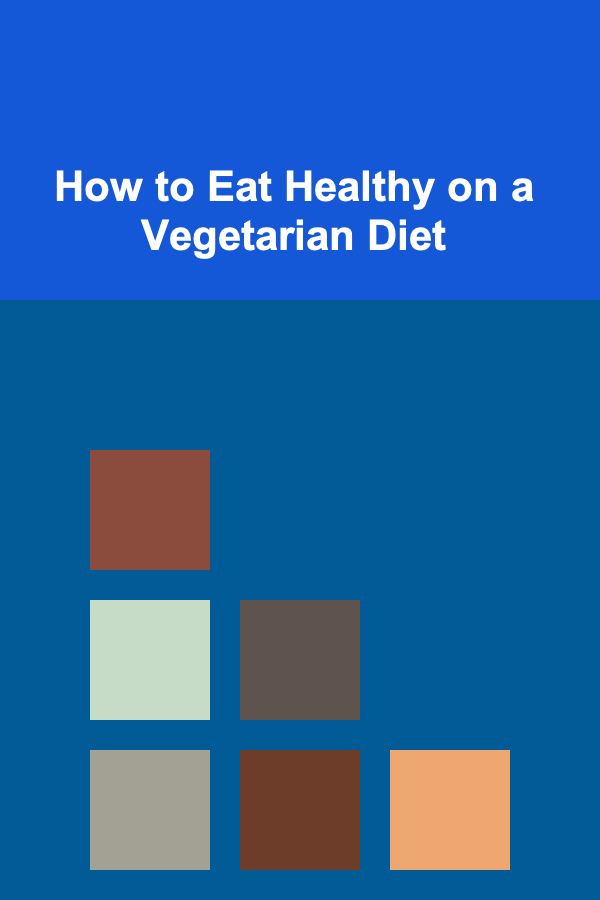
How to Eat Healthy on a Vegetarian Diet
ebook include PDF & Audio bundle (Micro Guide)
$12.99$5.99
Limited Time Offer! Order within the next:

A vegetarian diet has gained significant popularity over the years due to its potential health benefits, environmental impact, and ethical considerations. Whether you're choosing a vegetarian lifestyle for health reasons, to reduce your carbon footprint, or because of animal welfare concerns, it's important to understand how to make it work for you in the healthiest way possible. While a vegetarian diet can be highly nutritious, it requires careful planning to ensure that you're getting all the essential nutrients your body needs.
In this article, we will explore how to eat healthy on a vegetarian diet by focusing on essential nutrients, meal planning, and practical tips to make your diet both satisfying and well-rounded. We will also address common challenges vegetarians may face and how to overcome them.
Understanding a Vegetarian Diet
A vegetarian diet excludes meat, poultry, and fish but typically includes plant-based foods such as vegetables, fruits, legumes, grains, nuts, seeds, and dairy products. Some vegetarians also include eggs, while others follow a stricter plant-based (vegan) diet that excludes all animal-derived products.
The key to a healthy vegetarian diet lies in ensuring you get a variety of nutrients that you would otherwise obtain from meat and other animal products. These include protein, iron, calcium, vitamin B12, vitamin D, omega-3 fatty acids, and zinc.
1.1 Types of Vegetarians
Before diving into the specifics of healthy vegetarian eating, it's helpful to understand the different types of vegetarian diets:
- Lacto-vegetarian: Excludes meat, poultry, and fish but includes dairy products.
- Ovo-vegetarian: Excludes meat, poultry, and fish but includes eggs.
- Lacto-ovo-vegetarian: Excludes meat, poultry, and fish but includes both dairy products and eggs.
- Vegan: Excludes all animal products, including dairy, eggs, and often honey.
- Flexitarian: Primarily plant-based, but occasionally includes small amounts of meat or fish.
Key Nutrients for Vegetarians
While a vegetarian diet can provide all the essential nutrients, there are certain vitamins and minerals that vegetarians need to pay extra attention to. Let's take a look at each nutrient and how to ensure you get enough of it on a vegetarian diet.
2.1 Protein
Protein is essential for building and repairing tissues, making enzymes and hormones, and supporting immune function. While meat is a primary source of protein for many, vegetarians can easily meet their protein needs with plant-based sources.
Vegetarian Sources of Protein:
- Legumes: Beans, lentils, chickpeas, peas, and soybeans are rich in protein.
- Nuts and Seeds: Almonds, sunflower seeds, chia seeds, and pumpkin seeds are protein-packed.
- Tofu and Tempeh: These soy-based products are excellent protein sources and can be used in a variety of dishes.
- Whole Grains: Quinoa, farro, bulgur, and oats provide moderate amounts of protein.
- Dairy and Eggs: For lacto-vegetarians and ovo-vegetarians, dairy and eggs are excellent sources of protein.
2.2 Iron
Iron is crucial for the production of red blood cells and the transportation of oxygen throughout the body. Plant-based iron, known as non-heme iron, is not absorbed as efficiently as the heme iron found in animal products, but with proper planning, vegetarians can still meet their iron needs.
Vegetarian Sources of Iron:
- Leafy Greens: Spinach, kale, and swiss chard are rich in iron.
- Legumes: Lentils, chickpeas, and beans contain a good amount of iron.
- Fortified Foods: Many plant-based foods such as cereals, tofu, and plant-based milks are fortified with iron.
- Nuts and Seeds: Pumpkin seeds, sesame seeds, and almonds offer a healthy dose of iron.
2.3 Calcium
Calcium is essential for maintaining strong bones and teeth, nerve function, and muscle contraction. While dairy products are a primary source of calcium for many people, vegetarians can also find calcium in plant-based foods.
Vegetarian Sources of Calcium:
- Leafy Greens: Collard greens, bok choy, and broccoli are high in calcium.
- Fortified Plant Milks: Almond milk, soy milk, and oat milk are often fortified with calcium.
- Tofu and Tempeh: Both are excellent sources of calcium, especially when prepared with calcium sulfate.
- Almonds and Tahini: These are good sources of calcium.
2.4 Vitamin B12
Vitamin B12 is crucial for nerve function, red blood cell production, and DNA synthesis. Since B12 is found primarily in animal products, vegetarians need to be particularly vigilant in getting enough of this vitamin.
Vegetarian Sources of Vitamin B12:
- Fortified Foods: Many plant-based milks, cereals, and nutritional yeast are fortified with vitamin B12.
- Supplements: If you're not consuming fortified foods, a vitamin B12 supplement may be necessary.
2.5 Vitamin D
Vitamin D plays a key role in bone health and immune function. While sunlight is the primary source of vitamin D, vegetarians may struggle to get enough, especially if they live in areas with limited sunlight.
Vegetarian Sources of Vitamin D:
- Fortified Foods: Fortified plant milks and fortified cereals are good sources.
- Mushrooms: Certain types of mushrooms, such as maitake and shiitake, contain vitamin D.
- Supplements: Vitamin D supplements, especially those derived from algae, are a good option for vegetarians.
2.6 Omega-3 Fatty Acids
Omega-3 fatty acids are essential for heart and brain health. They are primarily found in fatty fish, but vegetarians can get omega-3s from plant-based sources.
Vegetarian Sources of Omega-3s:
- Flaxseeds: Ground flaxseeds are one of the best plant sources of omega-3s.
- Chia Seeds: These tiny seeds are packed with omega-3s.
- Walnuts: Walnuts are another great plant-based source of omega-3s.
- Hemp Seeds: These contain a healthy balance of omega-3 and omega-6 fatty acids.
2.7 Zinc
Zinc is essential for immune function, protein synthesis, and wound healing. While zinc is found in both plant and animal foods, the body absorbs zinc from animal products more efficiently.
Vegetarian Sources of Zinc:
- Legumes: Beans, chickpeas, and lentils are good sources of zinc.
- Nuts and Seeds: Pumpkin seeds, cashews, and hemp seeds offer zinc.
- Whole Grains: Oats, quinoa, and brown rice are rich in zinc.
- Fortified Foods: Some cereals and plant-based milks are fortified with zinc.
Meal Planning for a Healthy Vegetarian Diet
To ensure you're eating a well-rounded vegetarian diet, planning your meals is crucial. Below are some tips for creating balanced meals that meet your nutritional needs.
3.1 Include a Variety of Foods
The key to a healthy vegetarian diet is variety. By including a wide range of plant-based foods, you'll ensure you're getting all the essential nutrients your body needs. A balanced meal might include:
- A variety of vegetables (to provide fiber, vitamins, and minerals)
- Whole grains (to provide complex carbohydrates and protein)
- Legumes, nuts, and seeds (to provide protein and healthy fats)
- Fruits (for vitamins, antioxidants, and fiber)
- Dairy or plant-based alternatives (to provide calcium and vitamin D)
3.2 Focus on Whole Foods
While processed vegetarian foods, such as veggie burgers or meat alternatives, can be convenient, it's important to focus on whole, minimally processed foods. Whole grains, fresh vegetables, fruits, and legumes are nutrient-dense and provide a wide array of vitamins and minerals.
3.3 Prepare Balanced Snacks
Snacking can be a challenge on a vegetarian diet if you're not mindful of nutrient balance. Healthy vegetarian snacks might include:
- A handful of nuts and seeds
- Hummus with carrots or cucumber
- Whole grain crackers with cheese
- A smoothie made with plant-based milk, fruits, and seeds
Common Challenges and How to Overcome Them
While a vegetarian diet offers numerous health benefits, it also comes with certain challenges. Let's explore some common hurdles vegetarians face and how to overcome them.
4.1 Getting Enough Protein
One of the most common concerns about a vegetarian diet is whether it provides enough protein. To ensure you're meeting your protein needs, make sure to include a variety of protein-rich plant-based foods in your diet every day. Combine different sources of plant protein (like beans and grains) to ensure you're getting all the essential amino acids.
4.2 Iron Deficiency
Iron deficiency can be a concern for vegetarians, as plant-based iron is less bioavailable than animal-based iron. To enhance the absorption of iron, pair iron-rich foods with vitamin C-rich foods, such as citrus fruits, bell peppers, or tomatoes.
4.3 Vitamin B12 Deficiency
Since vitamin B12 is primarily found in animal products, it's important to either consume fortified foods or take a B12 supplement. Check food labels to ensure that the plant-based foods you're consuming are fortified with B12.
4.4 Social Situations and Eating Out
Being vegetarian can sometimes be challenging in social situations or when dining out, as many restaurants may not offer vegetarian-friendly options. To overcome this, consider preparing your own meals for events or calling ahead to inquire about vegetarian options. Many restaurants are accommodating to vegetarians and can modify dishes to suit your dietary needs.
Conclusion
Eating healthy on a vegetarian diet is entirely possible with careful planning and a focus on nutrient-dense, whole foods. By ensuring you're getting enough protein, iron, calcium, vitamin B12, omega-3 fatty acids, and other essential nutrients, you can maintain a balanced and nutritious diet. Whether you're a lacto-ovo-vegetarian, vegan, or flexitarian, the key is variety and mindfulness in your food choices.
By making informed choices and being proactive about meal planning, you can enjoy the many health benefits of a vegetarian diet while still meeting your body's nutritional needs. Whether you're new to vegetarianism or have been living this lifestyle for years, remember that the journey to health is all about balance and sustainability.
Reading More From Our Other Websites
- [Organization Tip 101] How to Design an Inspiration Board for Your Fitness Goals
- [Organization Tip 101] How to Use Tiered Shelving for Space Optimization
- [Home Soundproofing 101] How to Use Acoustic Panels to Improve Room Acoustics
- [Organization Tip 101] How to Use Color Coding for Easy Photo Album Organization
- [Organization Tip 101] How to Create a Home Office Corner in Your Living Room
- [Home Budget 101] How to Build a Home Budget for a Growing Family
- [Home Rental Property 101] How to Screen Tenants Effectively and Avoid Problem Renters
- [Personal Care Tips 101] How to Use Mouthwash to Prevent Bad Breath Throughout the Day
- [Home Family Activity 101] How to Combine DIY Bird Feeder Creation with Other Creative Art Projects for Families
- [Organization Tip 101] How to Make the Most of Vertical Storage in Your Home

How to Create a Checklist for Designing Mobile-Friendly Emails
Read More
How to Handle Tenants Who Don't Follow Rental Agreements
Read More
How to Host a Themed Party with Simple DIY Decorations
Read More
Mastering Content Marketing for Startups: A Comprehensive Guide
Read MoreHow to Integrate Your Water Tracker Planner with Other Health Goals
Read More
How to Make a Felt Fedora from Scratch
Read MoreOther Products

How to Create a Checklist for Designing Mobile-Friendly Emails
Read More
How to Handle Tenants Who Don't Follow Rental Agreements
Read More
How to Host a Themed Party with Simple DIY Decorations
Read More
Mastering Content Marketing for Startups: A Comprehensive Guide
Read MoreHow to Integrate Your Water Tracker Planner with Other Health Goals
Read More